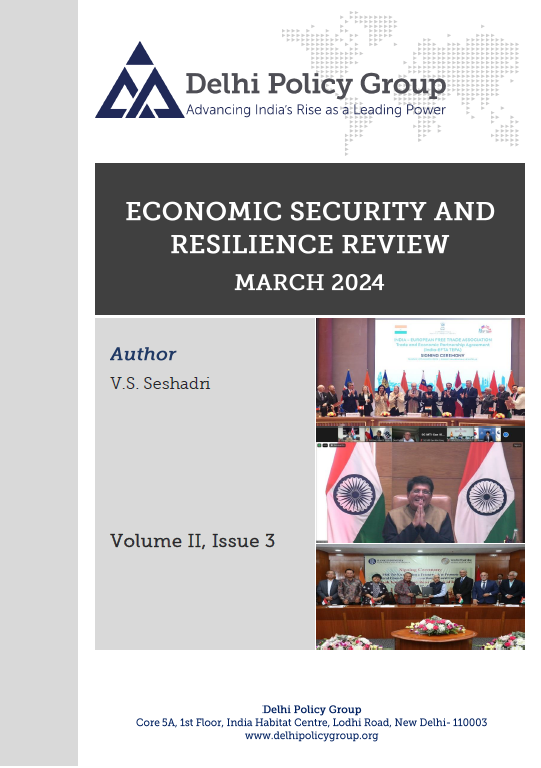Economic Security and Resilience Review
Date: April 05, 2024
This issue tracks the continuing progress being made by the Indo-Pacific Economic Framework (IPEF) for Prosperity at its virtual ministerial meeting held on March 14, 2024. The clean economy pillar and fair economy pillar agreements were finalised, as also the overall agreement that will govern the working of IPEF. While the future of the trade pillar remains unclear, the participant countries have decided to move ahead with the signing and ratification process relating to the already finalised agreements. The supply chain pillar of IPEF has already come into force with effect from February 24, 2024. Of particular importance is also the extensive work programme agreed upon for the next IPEF in-person ministerial meeting scheduled for June 6, 2024, indicating that IPEF is now actively moving on towards implementation.
India announced two important initiatives related to economic security during the month. These were the Rs.10,300 crore India - AI Mission seeking to bolster India’s AI ecosystem, and the launch of an e-vehicle policy that could attract world EV majors like TESLA to set up manufacturing in India.
The review also draws attention to a framework MOU signed between the governors of the central banks of India and Indonesia for increasing the use of the Indian Rupee and the Indonesian Rupiah in their bilateral trade and other transactions.
Despite significant efforts made by both sides during the fourteenth round of negotiations, the India-UK FTA could not be concluded. However, India’s FTA with the EFTA group of countries reached closure and was signed on March 10, 2024. This issue covers market access and other provisions of the FTA in some detail.
The US House of Representatives passed a bill on March 13, 2024 with broad bipartisan support that would force Byte Dance, the Chinese owner of the popular video app Tik Tok, to sell the app within six months or face a ban in the United States. It remains unclear if the bill will be passed by the US Senate.
Meanwhile, President Biden signalled his opposition to the intended purchase of US Steel by Nippon Steel of Japan.
The US is pushing its allies to further restrict access to chip making equipment and allied materials by China.
In advance of her visit to Beijing, Treasury Secretary Yellen warned China on its subsidies and other measures that are leading to overcapacities in solar panels, electric vehicles and lithium batteries,thereby hurting manufacturing in the rest of the world.
Finally, the review reports on the provisional deal reached between the EU Council and the European Parliament on March 5, 2024 on a regulation prohibiting products made with forced labour in the EU market.
These and certain other developments covered in this month’s ESRR can be viewed at ESRR, Vol. II, Issue 3.
To read this ESRR, Vol. II, Issue 3, please see the PDF attached.
India announced two important initiatives related to economic security during the month. These were the Rs.10,300 crore India - AI Mission seeking to bolster India’s AI ecosystem, and the launch of an e-vehicle policy that could attract world EV majors like TESLA to set up manufacturing in India.
The review also draws attention to a framework MOU signed between the governors of the central banks of India and Indonesia for increasing the use of the Indian Rupee and the Indonesian Rupiah in their bilateral trade and other transactions.
Despite significant efforts made by both sides during the fourteenth round of negotiations, the India-UK FTA could not be concluded. However, India’s FTA with the EFTA group of countries reached closure and was signed on March 10, 2024. This issue covers market access and other provisions of the FTA in some detail.
The US House of Representatives passed a bill on March 13, 2024 with broad bipartisan support that would force Byte Dance, the Chinese owner of the popular video app Tik Tok, to sell the app within six months or face a ban in the United States. It remains unclear if the bill will be passed by the US Senate.
Meanwhile, President Biden signalled his opposition to the intended purchase of US Steel by Nippon Steel of Japan.
The US is pushing its allies to further restrict access to chip making equipment and allied materials by China.
In advance of her visit to Beijing, Treasury Secretary Yellen warned China on its subsidies and other measures that are leading to overcapacities in solar panels, electric vehicles and lithium batteries,thereby hurting manufacturing in the rest of the world.
Finally, the review reports on the provisional deal reached between the EU Council and the European Parliament on March 5, 2024 on a regulation prohibiting products made with forced labour in the EU market.
These and certain other developments covered in this month’s ESRR can be viewed at ESRR, Vol. II, Issue 3.
To read this ESRR, Vol. II, Issue 3, please see the PDF attached.



